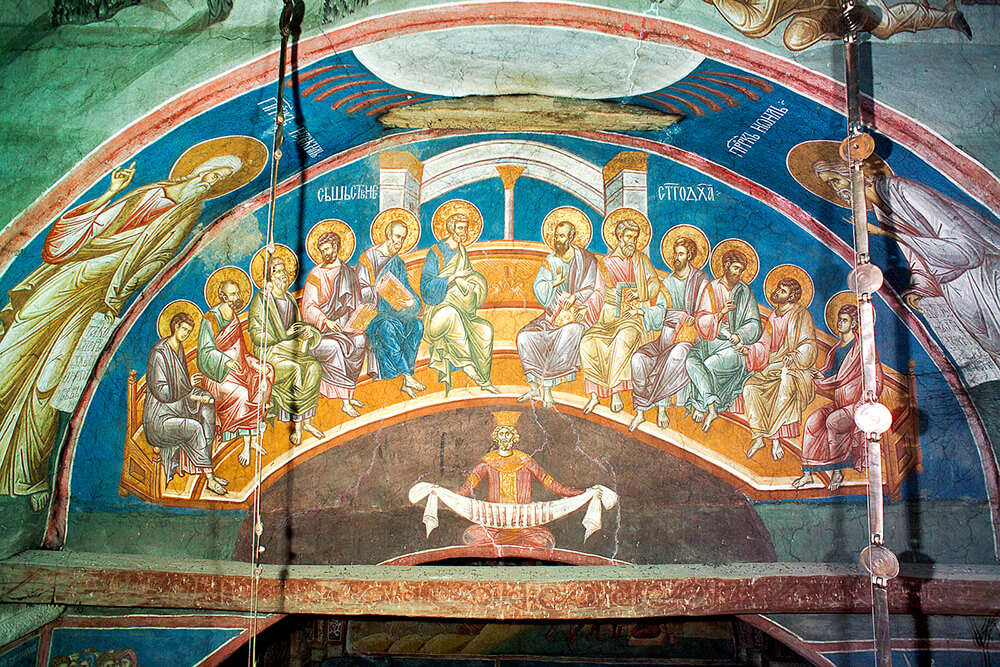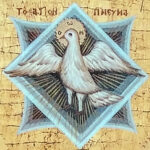
Today is the great feast, the fulfillment and crown of all holidays! The Lord says to the disciples, in his farewell address: “It is to your advantage that I go away; for if I do not go away, the Helper will not come to you” (John 16:7). It is this mystery, which is a little difficult for us to understand, of the conditions in which the Holy Spirit can descend upon the world. Last night at Vespers, we heard the prophecy of Joel, in which God the Father says that in the last days, “I will pour out My Spirit on all flesh; Your sons and your daughters shall prophesy” (Joel 2:28). Well, this cosmic event took place fifty days after the resurrection of the Lord, at Pentecost. It couldn’t have happened before. We deduce that the Holy Spirit cannot come on the world, on people, in just any way.
In the Gospel of the feast, the Lord says with a loud voice: “If anyone thirsts, let him come to Me and drink. He who believes in Me, as the Scripture has said, out of his heart will flow rivers of living water” (John 7:37-38). He also says this in the conversation with the Samaritan woman at Jacob’s well: “Whoever drinks of this water will thirst again, but whoever drinks of the water that I shall give him will never thirst. But the water that I shall give him will become in him a fountain of water springing up into everlasting life” (John 4:13-14). It’s the same idea. And St. John the Evangelist interprets that this was about the Holy Spirit which those who believed in Him were to receive (cf. John 7, 39). Therefore, the meaning of the word: “He who believes in Me, as the Scripture has said, out of his heart will flow rivers of living water,” is that the Holy Spirit will always be with the one who believes in the Lord.
But here we are not talking about a nominal belief. The Lord made the descent of the Holy Spirit possible today through all that He worked on earth. And, as Father Dumitru Stăniloae explains, so that we understand more clearly. But we also have in the visions of the saints, for example, the vision of St. Josaphat from the monastery of Saint Sava, from 1854, which is translated from Greek and transcribed by St. John Jacob. We read that the elder, led by the Holy Great Martyr George, was taken to the Palace of the Emperor of Glory – Christ, in the heavens. Upon arriving there, he talks about the light that flooded everything. That light came from the Lord. What do we mean here? The grace of the Holy Spirit is shared with us through the body, the human nature of the Lord, through the sanctified, deified body of the Lord. Thus, we can share in the grace of the Holy Spirit. And we do it every time we receive Holy Communion at the Divine Liturgy. Thus, through the purified nature of the Lord, the Holy Spirit is shared with us. Therefore, the Lord said, “for their sakes I sanctify Myself” (John 17:19). He was thinking of total sacrifice. Because Father Dumitru Stăniloae tells us that, on the cross, the Lord removed from His human nature any opposition to God, which had been established in human nature after sin. He did this by perfect obedience, even unto death. Then He made it possible to receive the fullness of the grace of God, the Holy Spirit, by our human nature. Through His human nature, purified, sanctified, the Holy Spirit is shared with us. Just like that. We have no direct access to the Holy Spirit. As Father Zacharias Zacharou says: “There is no connection between our world and God’s world. Only God’s grace makes the bridge, the connection between the two worlds.”
Therefore, in order to attract the grace of the Holy Spirit, we must believe in the Lord. But not a nominal belief, but a belief through works. Let us do what He has done, let us follow His commandments. Because only by following the Lord, doing what He does, can we attract the Holy Spirit. We must follow the Lord closely, precisely, and, with His help, make ourselves like Him. Or as the Holy Apostle Paul says: “For if we died with Him, we shall also live with Him” (2 Timothy 2:11), we too will have the Holy Spirit. The Lord is for us a practical target, a model to follow. The Holy Spirit is invisible.
At Pentecost, the apostles spoke in various languages, but each understood in his own language. This is the Holy Spirit. When He is active, He communicates without words. This is how we know God through the Holy Spirit. And this is a knowledge beyond thought, beyond word. It’s instant, total knowledge. Our fathers had the Holy Spirit. And the Holy Spirit shared with them all the knowledge of God, all theology. And we have fellowship with the Holy Spirit every time we receive the Holy Eucharist. Every time we receive Communion, we have fellowship not only with the sacrificed, resurrected, deified blood and flesh of the Lord, but also with the Holy Spirit. Every time we receive Communion, we live Pentecost. Therefore, as Father Zacharias said a week ago: “The Divine Liturgy is the greatest teacher, it teaches us the mysteries of God, the prayer of the heart, all of them; if we give it our time, if we prepare. We must live with the thought of the next Liturgy. And so, whatever we experience, any shortcomings, will melt away in Holy Communion and become, if I have faith, a source of grace, of spirit.”
In short, if we live like Christ, we will have the Holy Spirit. And this is the only way to have the Holy Spirit. Not nominal belief, not rational, not declarative, but factual. If we follow Christ, if we know how to turn the cheek, to endure, to forgive, to bring repentance, then we will have the Holy Spirit. We were talking about the two worlds, that of God and ours, which have no ties with each other. The Lord having come here, in our world, shows us what the world beyond is like and how the grace of God is drawn in order to have access to that world. Whoever believes in Him with all the heart, with all the power and deed, will have the Holy Spirit.

